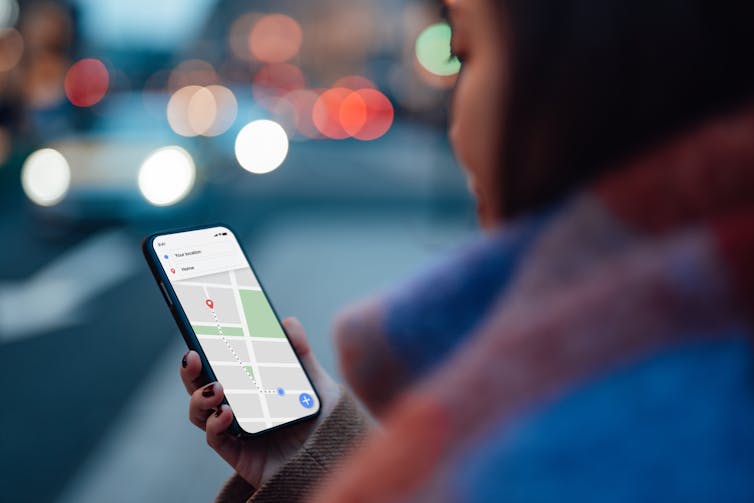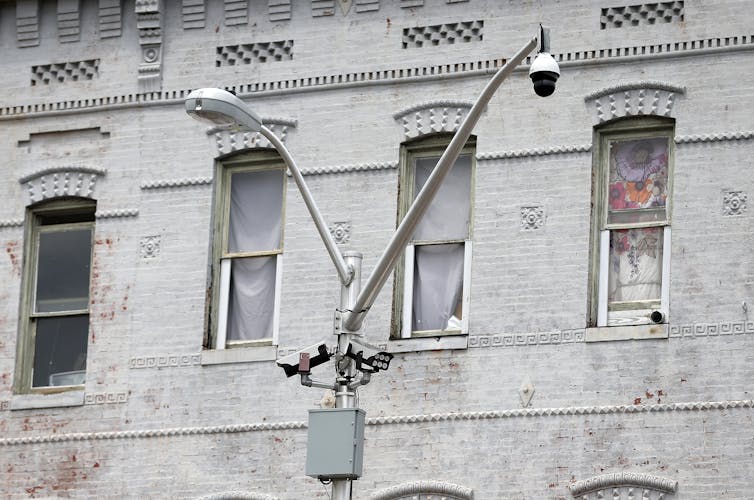The U.S. has the largest variety of surveillance cameras per individual on this planet. Cameras are omnipresent on metropolis streets and in accommodations, eating places, malls and workplaces. They’re additionally used to display screen passengers for the Transportation Safety Administration. After which there are sensible doorbells and different dwelling safety cameras.
Most Individuals are conscious of video surveillance of public areas. Likewise, most individuals learn about on-line monitoring – and need Congress to do one thing about it. However as a researcher who research digital tradition and secret communications, I consider that to grasp how pervasive surveillance is, it’s necessary to acknowledge how bodily and digital monitoring work collectively.
Databases can correlate location knowledge from smartphones, the rising variety of personal cameras, license plate readers on police cruisers and toll roads, and facial recognition expertise, so if legislation enforcement needs to trace the place you might be and the place you’ve been, they will. They want a warrant to make use of cellphone search tools: Connecting your machine to a cellular machine forensic device lets them extract and analyze all of your knowledge if they’ve a warrant.
Nevertheless, personal knowledge brokers additionally observe this sort of knowledge and assist surveil residents – and not using a warrant. There’s a giant marketplace for private knowledge, compiled from data folks volunteer, data folks unwittingly yield – for instance, by way of cellular apps – and data that’s stolen in knowledge breaches. Among the many clients for this largely unregulated knowledge are federal, state and native legislation enforcement companies.
How you might be tracked
Contents
Whether or not or not you cross below the gaze of a surveillance digital camera or license plate reader, you might be tracked by your cell phone. GPS tells climate apps or maps your location, Wi-Fi makes use of your location, and cell-tower triangulation tracks your cellphone. Bluetooth can establish and observe your smartphone, and never only for COVID-19 contact tracing, Apple’s “Discover My” service, or to attach headphones.
Folks volunteer their areas for ride-sharing or for video games like Pokemon Go or Ingress, however apps may gather and share location with out your data. Many late-model vehicles function telematics that observe areas – for instance, OnStar or Bluelink. All this makes opting out impractical.

Oscar Wong/Second by way of Getty Photos
The identical factor is true on-line. Most web sites function advert trackers and third-party cookies, that are saved in your browser everytime you go to a web site. They establish you once you go to different websites so advertisers can comply with you round. Some web sites additionally use key logging, which screens what you kind right into a web page earlier than hitting submit. Equally, session recording screens mouse actions, clicks, scrolling and typing, even in case you don’t click on “submit.”
Advert trackers know once you browsed the place, which browser you used, and what your machine’s web tackle is. Google and Fb are among the many foremost beneficiaries, however there are numerous knowledge brokers slicing and dicing such data by faith, ethnicity, political affiliations, social media profiles, earnings and medical historical past for revenue.
Huge Brother within the twenty first century
Folks might implicitly consent to some lack of privateness within the curiosity of perceived or actual safety – for instance, in stadiums, on the highway and at airports, or in return for cheaper on-line companies. However these trade-offs profit people far lower than the businesses aggregating knowledge. Many Individuals are suspicious of presidency censuses, but they willingly share their jogging routines on apps like Strava, which has revealed delicate and secret navy knowledge.
Within the post-Roe v. Wade authorized atmosphere, there are issues not solely about interval monitoring apps however about correlating knowledge on bodily actions with on-line searches and cellphone knowledge. Laws just like the latest Texas Senate Invoice 8 anti-abortion legislation invokes “personal particular person enforcement mechanisms,” elevating questions on who will get entry to monitoring knowledge.
In 2019, the Missouri Division of Well being saved knowledge in regards to the durations of sufferers on the state’s lone Deliberate Parenthood clinic, correlated with state medical data. Communications metadata can reveal who you might be in contact with, once you had been the place, and who else was there – whether or not they’re in your contacts or not.
Location knowledge from apps on a whole lot of tens of millions of telephones lets the Division of Homeland Safety observe folks. Well being wearables pose comparable dangers, and medical consultants notice a lack of understanding in regards to the safety of information they gather. Observe the resemblance of your Fitbit or smartwatch to ankle bracelets folks put on throughout court-ordered monitoring.
Essentially the most pervasive person of monitoring within the U.S. is Immigration and Customs Enforcement (ICE), which amassed an enormous quantity of data with out judicial, legislative or public oversight. Georgetown College Legislation Middle’s Middle on Privateness and Know-how reported on how ICE searched the motive force’s license pictures of 32% of all adults within the U.S., tracked vehicles in cities dwelling to 70% of adults, and up to date tackle data for 74% of adults when these folks activated new utility accounts.

AP Photograph/Julio Cortez
Nobody is watching the watchers
No person expects to be invisible on streets, at borders, or in procuring facilities. However who has entry to all that surveillance knowledge, and the way lengthy it’s saved? There may be no single U.S. privateness legislation on the federal stage, and states deal with a regulatory patchwork; solely 5 states – California, Colorado, Connecticut, Utah and Virginia – have privateness legal guidelines.
It’s potential to restrict location monitoring in your cellphone, however to not keep away from it utterly. Knowledge brokers are speculated to masks your personally identifiable knowledge earlier than promoting it. However this “anonymization” is meaningless since people are simply recognized by cross-referencing extra knowledge units. This makes it simple for bounty hunters and stalkers to abuse the system.
The largest threat to most individuals arises when there’s a knowledge breach, which is going on extra typically – whether or not it’s a leaky app or careless resort chain, a DMV knowledge sale or a compromised credit score bureau, or certainly a knowledge brokering intermediary whose cloud storage is hacked.
This illicit stream of information not solely places fuzzy notions of privateness in peril, however might put your addresses and passport numbers, biometric knowledge and social media profiles, bank card numbers and courting profiles, well being and insurance coverage data, and extra on sale.
Supply By https://theconversation.com/surveillance-is-pervasive-yes-you-are-being-watched-even-if-no-one-is-looking-for-you-187139